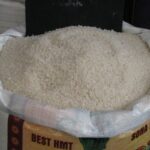Accra, Sept. 29, GNA – Participants at a workshop on the promotion of the consumption of soybeans said more deliberate policy action was needed to exploit fully the economic and health potential of the legume. They maintained that while there was growing demand for the crop within and outside the country farmers had been unable to meet the demand because of poor investment and agronomy practices that inhibited increased production.
Currently, the country produces 47,000 tonnes of the crop a year, although this has been on the increase in the past three years. The participants cited China, which alone consumes about 96 million tonnes of soy, but is only able to produce 70 million tonnes as a major trade destination to be exploited.
They also mentioned the stable world price of the legume as major incentive for farmers, who might want to go into long-term commercial production of the crop.
Soy for vegetable oil production sells at between 230 dollars and 255 dollars per tonne on the world market; and that used for meal is valued at between 175 dollars and 214 dollars per tonne while that which is used for the production of crude oil sells at between 540 dollars and 600 dollars per tonne.
Dr Wisdom Plahar, Director of Food Research Institute, said currently over 50 recipes could be prepared from the legume and that research in the area was still ongoing.
Efforts were also being made to assist farmers with extension services to increase yield per hectare.
While farmers in other parts of the world realized between 2.5 tonnes to 2.8 tonnes per hectare, Ghanaian farmers are only able to get 1.5 tonnes per hectare.
Mrs Victoria Daaku of the Adventist Development and Relief Agency, who shared her organization’s working experience with farmers in the production of the legume, told the forum that to increase consumption it was important not to introduce soybeans as a new or different food item but to incorporate it into existing diet.
She said there was a positive reaction from farmers in the nine regions that ADRA had been working with farmers, adding, however, that access to seed for cultivation and long cooking time are some of the challenges facing increased cultivation.
Dr Karl Weingartner of the Illinois Centre for Soy Foods, University of Illinois, said research had shown that consumption of 25 grams of soy protein a day, as part of diet low in saturated fat and cholesterol, might reduce the risk of heart diseases.
Other areas of concern were processing and storage to increase the lifespan of the processed products.
The World Initiative for Soy in Human Health and Counterpart International organized the programme in efforts to eradicate extreme poverty and hunger, achieve universal primary education and promote gender equality and empower women as their contribution to attaining the Millennium Development Goals. 29 Sept. 06
Source: GhanaWeb











